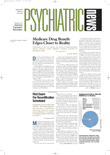Charles Krauthammer, M.D., a psychiatrist and well-known American political commentator, gave the Convocation lecture at APA's annual meeting in San Francisco in May. He argued that, because of advances in biotechnology, terrorism could lead to the worst violence the world has ever known.
"I think he is wrong," declared Harold Eist, M.D., a former APA president and the outgoing chair of the APA Council on Global Psychiatry, at an annual meeting workshop titled "Global Trauma: Experience and Implications for DSM-V."
Eist, in fact, argued that the world has always been a turbulent place. Read the thriller The DaVinci Code by Dan Brown, he challenged his audience. The novel describes how incredibly dangerous it was to travel in the Middle Ages, he said.
On the one hand, whether world violence is increasing is obviously in question. On the other hand, no one seems to be making the case that there is less world tempestuousness than of yore. Thus, there is a pressing need to better understand the psychological toil that human savagery takes, global trauma experts concur.
Take the question of dose. One would assume that the more a person is exposed to rabid human behavior, the greater his or her risk of being adversely affected psychologically. Indeed, a study conducted by Lars Weisaeth, M.D., a psychiatrist at the University of Oslo in Norway, and colleagues and reported at the global trauma workshop suggests that this is the case.
During the 1980s, Weisaeth explained, a number of Norwegian sailors voyaging into the Persian Gulf experienced terrorist attacks. Some 300 were killed. Weisaeth and his coworkers attempted to find out whether those sailors who made numerous voyages into the Persian Gulf during those years experienced more psychological difficulties than had sailors who made fewer such voyages at that time. The answer was yes, they found. For instance, 37 percent of the sailors who made 20 or more voyages had psychological problems, whereas only 18 percent of the sailors who made one to five voyages did.
Also, being exposed to brutality up close may increase people's risk of being adversely affected psychologically, Arieh Shalev, M.D., a psychiatrist at Hadassah University in Jerusalem, pointed out at the workshop. Research conducted in conjunction with the events of September 11, 2001, suggest that this is so. For instance, in one study, New Yorkers were found to experience more psychological problems following the terrorist attacks than were residents of other American cities (Psychiatric News, September 6, 2002).
In contrast, Shalev pointed out, those individuals who have a "front-row seat," so to speak, on ferocity may not always be those individuals who will be most hurt psychologically.
For instance, from autumn 2000 to spring 2003, Shalev explained, there have been 72 suicide-bomber attacks in Israel, leading to more than 700 deaths and some 5,000 injuries. Most of the attacks have occurred in Jerusalem. So Shalev and his coworkers conducted a study to see how these attacks have affected Jerusalem residents. They compared the psychological outcomes for a group of residents who had been highly exposed to the attacks with the psychological outcomes of a group of Jerusalem residents who had not been so exposed. And to their surprise, they found that the prevalence of posttraumatic stress disorder was comparable in both groups. "So we are not seeing a proximity effect" of violence exposure as in the United States after September 11, 2001, he concluded.
Whether people are more psychologically impacted by violence when it is physically close or not, the question of how violence impacts people psychologically still presses for an answer, of course. In other words, what form is it most likely to take?
Certainly depression in a number of cases, Elie Karam, M.D., a psychiatric epidemiologist at St. George's Hospital in Beirut, Lebanon, reported at the workshop. This is what he and his colleagues have found in studies conducted on the psychological effects of war on the Lebanese people. Another reaction is depression with posttraumatic stress disorder-but rarely posttraumatic stress disorder alone. "Comorbidity seems to be the name of the game," he declared.
Still, Weisaeth and his team found just the opposite in their Norwegian sailor subjects -cases of posttraumatic stress disorder without depression. The reason may be because the sailors were a mentally healthy cohort before they set sail for the Persian Gulf, Weisaeth speculated.
Separation anxiety is still another reaction to violence, Robert Ursano, M.D., chair of psychiatry at the Uniformed Services University of the Health Sciences and a leading American trauma authority, pointed out at the workshop. Some 15 percent of the children directly impacted by September 11, 2001, experienced separation anxiety, he said. A number of adults exposed to violence probably did as well, he suspects.
Yet the truth, he added, is that most people recover psychologically after being exposed to brutality. Thus, "we are called upon to understand resiliency better," he declared. ▪


